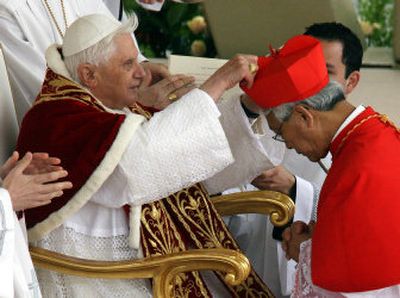Pope Benedict turns heads both ways

VATICAN CITY – Pope John Paul II’s death a year ago – April 2, 2005 – left many Roman Catholics expecting that their church would take an even harder, more conservative line if the College of Cardinals picked early favorite Joseph Ratzinger as the next pontiff.
They got Ratzinger – now Pope Benedict XVI.
Yet the Vatican’s German-born chief orthodoxy watchdog has hardly acted like the man saddled with the nickname “God’s Rottweiler.”
Instead, the faithful got a pope who rode around in St. Peter’s Square in traditional papal headgear that resembled a Santa Claus hat. The man described as a “dour Bavarian” wrote his first encyclical on love.
That’s not to say that Benedict has changed his doctrinal tune. On the contrary, he has reaffirmed church teaching on everything from sexuality to the sanctity of life.
But in his first year as pope, Benedict has confounded left and right through a handful of small yet significant changes that defy easy interpretation. He is very much his own, unpredictable man.
Take for example that first encyclical, “God is Love,” an exploration of love and charity that focused on the different types of love – erotic and unconditional – that Benedict said were joined in marriage between man and woman.
“What other pope in history made his major encyclical on erotic love?” asked the Rev. Joseph Fessio, a conservative Jesuit who has known Benedict since the 1970s, when he was the German theologian’s doctoral student.
“Now we have the ‘panzer cardinal,’ the ‘dour Bavarian,’ ‘God’s Rottweiler’ defending love!” Fessio said. “What a paradox!”
Indeed, ever since his April 19 election, Benedict has been anything but boring.
He has shown a pastoral and populist side unfamiliar to many, humbly joking that he felt like a guillotine was falling on him when he realized he would be pope, and then making the popular decision of placing John Paul on the fast track to possible sainthood.
He made some surprising choices in naming his first batch of cardinals, promoting an outspoken critic of China, Hong Kong bishop Joseph Zen, despite the Vatican’s new push to re-establish diplomatic relations with Beijing.
And he shocked Catholics across the theological spectrum by meeting with his harshest liberal critic, Hans Kueng, as well as the excommunicated ultraconservative Bishop Bernard Fellay, who heads a Swiss-based schismatic movement founded by the late Archbishop Marcel Lefebvre.
“When he was elected, the left was very worried and the right was delighted, and both of them expected him to come in like a gangbuster and start an attack cleaning up the church, coming in like the Grand Inquisitor,” said the Rev. Thomas Reese, a Jesuit who resigned last year under Vatican pressure as editor of America magazine.
“Of course he totally surprised people that way because his personality, which is quite charming, came through as a charming Bavarian rather than an authoritarian Prussian.”
Aside from his public persona, Benedict’s few yet decisive moves have also surprised observers of the church hierarchy.
In one of his few bureaucratic changes, Benedict removed the Vatican’s top expert on Islam, Archbishop Michael Fitzgerald, as head of the Vatican’s office for relations with Muslims and other religions, and sent him to Egypt as papal envoy. He then merged Fitzgerald’s old office with the Vatican’s culture office.
Analysts like Fessio said Fitzgerald was probably removed because he was seen as being too soft on Islam, promoting dialogue with Muslims at all costs when the Vatican should be pressing Islamic countries hard to respect religious freedom.
Others, like Reese, warned of the dangers of “exiling” such a knowledgeable expert at a time when the Vatican’s relations with Muslims are so important.
Benedict’s only other major move within the Vatican has also sparked questions, particularly on the right.
The appointment of Cardinal William Levada as prefect of the Congregation of the Doctrine of the Faith provoked “widespread puzzlement” among conservatives, the Rev. Richard John Neuhaus, editor of the conservative magazine First Things, wrote last month.
Levada, he wrote, had not effectively preached the church’s doctrine on homosexuality during his tenure as San Francisco archbishop.
Neuhaus said Benedict now faced a “defining test” of his pontificate in how he chose to deal with the dissent that emerged from liberals to the first major document issued under his pontificate, an instruction effectively banning gays from joining the priesthood.
This is not to say that the left is entirely pleased with Benedict, either.
The Europe-based reform group “We Are Church” has criticized Benedict for the same gay priest document because it says that homosexuals should not be ordained.
The group has also criticized what it calls Benedict’s “Eurocentric” attitude, neglecting the needs of the developing world by focusing so much on reasserting the Christian roots of Europe and the challenges the continent is facing. “We had hoped for a change,” said Vittorio Bellavite, a spokesman for We Are Church in Italy. “It’s not like we are happy to be confirmed; we want to be proved wrong.”
Benedict, however, has won widespread praise for other initiatives.
Jewish groups have hailed his outreach, praising in particular his visit to a Cologne synagogue and his many meetings with Jewish groups at the Vatican. They also point to his upcoming visit to the Auschwitz concentration camp during his planned trip to Poland in May.
“He has made it very clear that his commitment to this endeavor is no less than (that of) his predecessor,” said Rabbi David Rosen, who heads the interreligious relations office for the American Jewish Committee. “This is very good news for the Jews.”
Orthodox Christians have similarly applauded his efforts to unite all Christians – a pledge made the day after his election and regularly repeated since then. Benedict will further demonstrate his commitment in November when he visits Turkey, home to the spiritual leader of the world’s Orthodox Christians.